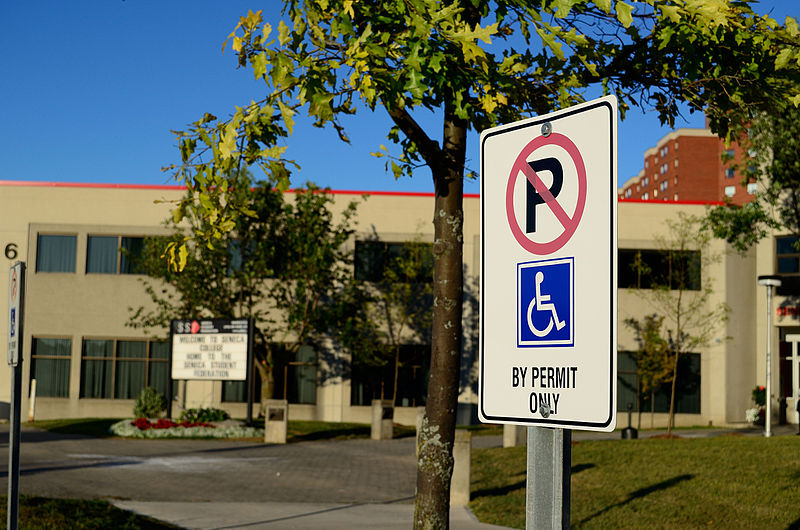Julie Entwistle, MBA, BHSc (OT), BSc (Health / Gerontology)
One of my former clients was a teenager when he broke his neck falling out of a truck. As a result, he was required to use a wheelchair for all mobility. One day I arrived and he was wearing a t-shirt that said “I am in it for the parking”.
We are all aware of handicap parking spots. These wider spots are conveniently located at the front of a parking lot, near an entrance to the building, close to a sidewalk with a curb cut, and are typically marked with bright yellow and blue paint or a sign reminding you the spot has special use.
In the news this week I read two very different stories about these parking spaces:
The first was about a woman who parked in a handicap spot to enter Tim Horton’s. When she returned to her vehicle she was confronted by a man about her choice of parking spot. In the altercation she threw her coffee at him. He recorded the interaction and posted the video online and it went viral – over a million views in a few days. See the full story here.
The second describes the challenges a young woman frequently faces when using her handicap permit. Recently she returned to her vehicle to find a note saying “stupidity is not a disability” and has had other similar messages left on her car in the past. Yet in her case she has a condition that justifies her use of the pass, but the condition is not one that other people can see and thus understand. See the full story here.
As an occupational therapist that is frequently requested to complete Accessible Parking Permit Applications, let me explain how this works. To receive a permit, you must complete a Service Ontario application and this needs to be signed by a physician, occupational therapist, nurse, physiotherapist, chiropractor or chiropodist. The form outlines the types of disabilities that qualify including those that cause mobility, breathing or cardiac impairments, or poor vision. As some people with significant ailments like these can’t drive, they can still get a permit to be used as a “passenger”. The professional signing the form is asked to indicate if the condition is “permanent”, “subject to change” or “temporary”. This allows professionals to indicate that someone with a leg fracture, for example, may only need the pass for three months, or that is it “subject to change” if they have a condition that is likely to improve. If you are curious about this form, and how it works, you can access it here.
So what happens when you don’t have a permit and you park in a handicap spot? First of all, in the absence of an urgent situation, you are a jerk. If caught, the fine is steep at $450.00. In one article, The Toronto Star reported that the City had issued over 5,000 tickets since 2005 for one particular handicapped spot, totalling $1.9M. Second, you may be subject to comments, ridicule or confrontation by others who judge you harshly for what most would consider an ignorant decision. Third, you have just made life a little bit harder for someone that could use a break. These spots are designed to reduce the physical risk of prolonged walking for people that might not be able to walk far, that might struggle to manage a wheelchair or walker over uneven terrain or a curb, or for those that are at risk of injury or falls when walking outdoors. For people that struggle to leave the house and have difficulty managing in the community, being able to park close to a store may mean the difference between going out or not. Your ignorance may reduce their confidence to venture out again. Shame on you.
And what about the opposite? What happens when you judge and ridicule someone that has a permit when you, apparently an expert in disability, feels that this is not required? You are still being a jerk. Not only are you making someone who already struggles to feel worse about their condition, but you are also passing judgement on the process that is in place to qualify people, including the professional that decided they met the criteria in the first place. While I can appreciate that some people may feel they are being helpful to “police” these spots, it is important to trust the process and to respect that people may have these permits for reasons that are unseen. Instead of taking your time to write a degrading note, perhaps consider two other options:
1. Say nothing, do nothing, and don’t react emotionally. The situation is none of your business. If they stole their grandmother’s parking permit to try and skirt the drive-thru, well Karma is a bitch.
2. Have compassion. If someone went through the process of getting a pass, then they need it and have struggles that you don’t understand.
Have I ever turned down an application for a parking pass? Yes, because someone didn’t qualify. I trust my colleagues also do the same. And no, my experience is that people with mobility, vision, breathing or heart problems are not “in it for the parking”.

